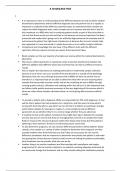Lecture notes
sampling body fluid
- Module
- Clinical science
- Institution
- Aston University, Birmingham (Aston)
preview:• It is important to have an understanding of the different diseases we look at within medical biochemistry laboratories and the different diagnostic tests we perform but it is equally as important to understand the difference specimen types to understand which samples we require for whic...
[Show more]



